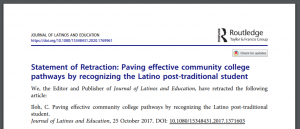A journal has issued an expression of concern for a 2008 paper suggesting artificial sweetener Splenda could disrupt the gut microbiome and cause other havoc with the gastrointestinal system – and which is cited by a paper at the center of a lawsuit against one of its authors by the maker of the sugar substitute.
The article, “Splenda Alters Gut Microflora and Increases Intestinal P-Glycoprotein and Cytochrome P-450 in Male Rats,” appeared in the Journal of Toxicology and Environmental Health, Part A, a Taylor & Francis title. The journal has a Part B, too, which also is part of this story.
The paper, which has been cited more than 200 times, according to Clarivate’s Web of Science, caught the attention of Elisabeth Bik, who last year commented on the article on PubPeer, noting potential problems with four of the figures, including Western blots and missing error bars.
Continue reading Paper cited by article at center of lawsuit for criticizing Splenda earns an expression of concern







